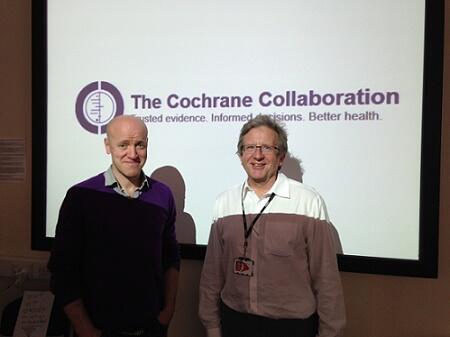
The LSTM Seminar Series continued on Wednesday with a presentation delivered by LSTM’s Dr David Sinclair and Professor Paul Garner, who are part of the Cochrane Infectious Diseases Group, based at LSTM. Their seminar was entitled “Evidence for Global Malaria Policy: briefing session on recent Cochrane reviews.”
Dr Sinclair introduced the seminar by looking at the place of systematic reviews in the development of World Health Organization (WHO) guidelines. He reported an evaluation of WHO guidelines carried out in 2007 that found that they had fallen behind internationally recognised standards, and rarely used systematic appraisals of the evidence. This report triggered a major change in the way WHO formulates recommendations, and they now follow the GRADE approach which aims to base recommendations on a comprehensive and objective assessment of the available evidence, and be transparent so that the reader can see how the recommendation has been developed, by whom, and on what basis.
He explained that the WHO provide two different types of recommendation; ‘strong’ recommendations where the benefits of following the recommendation clearly outweigh the disadvantages; and ‘conditional’ where the benefits and harms are more finely balanced but the intervention could be considered in some settings.
He went on to present the key findings of two new Cochrane Reviews in Malaria which influenced the upcoming third edition of the WHO malaria treatment guidelines; “Artesunate plus pyronaridine for treating P. falciparum malaria” and “Dihydroartemisinin-piperaquine for treating uncomplicated P. falciparum malaria”. He looked at the types of studies that made up the review, what participants were involved, and looked at both efficacy and safety outcomes. He explained how the quality of evidence was appraised against five different criteria: risk of bias, consistency, directness, precision and other, and discussed the balance of both desirable and undesirable effects. He then described the different judgments the WHO expert committee would need to make in moving from the evidence to making a recommendation, and explained how they were trying to ensure these judgements were transparent.
After talking through the results of both reviews Dr Sinclair handed over to Professor Garner, who discussed a further review currently in progress, which examines the effects of “Primaquine for reducing Plasmodium falciparumtransmission”. He noted that this was currently recommended by the WHO, but had attracted some criticism as many programme managers are concerned about the harmful effects of primaquine in people with G6PD deficiency. He went on to describe how the Cochrane group was trying to examine and present the evidence on both efficacy and safety to contribute to transparent decision making in global malaria polices. “Policies often require a judgement made in the face of uncertainty”, Professor Garner explained. “There is nothing wrong with this, it just needs to be explicit, so it can be modified if required in the light of new and emerging evidence.”